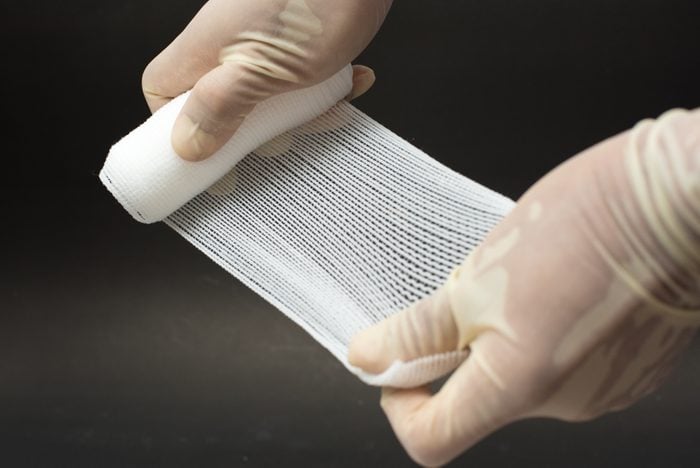
When we go in for surgery, we place our lives in the hands of those who are operating on us. While most surgeries go off without a hitch, medical errors are also common. In fact, one study estimated that they’re the third leading cause of death in the United States, claiming more than more than 250,000 lives per year. So what errors are happening in the operating room? Here are some true stories that will give you pause.

Oh my gauze
Sponges, needles, and surgical instruments are left behind in patients more often than you would think. In fact, research has shown that it happens anywhere from 4,500 to 6,000 times in the United States each year. About 70 percent of the time, it’s gauze or a sponge that remain in patients’ bodies. But 5 percent of the time, surgeons leave their scalpel. Or something else. One scary story? A foot-long pipe was removed from a Czechoslovakian woman five months after an earlier surgery.

A burgeoning belly
After an emergency C-section, Air Force Major Erika Parks experienced extreme pain and swelling in her stomach. And unlike most mothers who’ve just given birth, her belly continued to grow. The culprit? A sponge that was entangled in her intestines. It took doctors six hours to remove the infected tissue. Here’s what happens when a medical mistake takes a patient’s life.

Double whammy
An unnamed woman in Kentucky got more than she expected when she went in for a hysterectomy in 2006. Doctors removed her uterus all right, but they replaced it with a surgical sponge. It took six months to figure that out. When the sponge was removed, they had to take out part of the woman’s small intestine as well. A jury later awarded the woman $2.5 million in damages.

Intestinal distress
Another case of misplaced sponges involves a man named Lenny LeClair. He kept projectile vomiting, and couldn’t help but notice that it smelled like feces. He got a CT scan, which showed that several sponges from a surgery the year before remained in his intestines. They caused an infection that destroyed parts of LeClair’s colon. Doctors had to remove parts of his intestines, and he had to use a colostomy bag.

Brain surgery gone awry
Safety procedures such as drawing a big X on a patient’s head where surgeons should operate are supposed to guard against mistakes. But despite that, surgeons at Rhode Island Hospital repeatedly sliced into the wrong side of patients’ heads in 2007. In two of those cases, the surgeons had cut all the way through the skulls before they realized they had made a mistake. After the third error, the Rhode Island Department of Health fined the hospital $50,000. On the other hand, here are some mistakes doctors wish you’d stop making.

Take it to heart
William Barlow went in to the Veterans Administration Hospital with an aortic aneurysm in 2000. A bulge in the part of the aorta that runs through the stomach, it was important to fix it before it exploded. A week after the surgery, though, Barlow’s fever spiked to 105 degrees. Doctors learned he had developed a blood infection called sepsis, which can lead to organ failure. It wasn’t until a second surgery in 2001 that doctors discovered the problem: a surgical towel the size of a bath towel that had wrapped itself around his intestines. Barlow sued the VA, which admitted blame and offered him $100,000. The VA argued that other issues had contributed to Barlow’s poor health. Barlow decided to go to trial instead, and a judge awarded him $450,000.

Full-throated emergency
In 2012, Becky Anderson went into Central Washington Hospital for elective surgery to get some polyps removed from her larynx. But while Anderson was under anesthesia, her breathing tube ruptured and burst into flame. After several surgeries to correct the damage to her throat, Anderson sued the hospital. She was awarded $30 million. A separate lawsuit against the manufacturer of the air tube used in her throat was dismissed. Here are the questions you should really be asking your doctor.

The final cut
First, Hurshell Ralls’s wife told him the good news. Doctors had removed the cancer from his bladder. Then came the bad news. They had also taken off his penis and testicles. “I was one mad dude,” Ralls told reporters. Why? In addition to never mentioning to their patient that they were going to remove his penis, the doctors never tested his tissue for cancer. As a test of his removed organ showed, Ralls didn’t have cancer. He sued, and after two days of trial, the parties reached a confidential settlement.

An admission and denial
After having spinal surgery, John P. Freel chalked up the pain he was feeling in his lower back up to the typical aches of recovery. Then the phone rang. The attending physician during his surgery, Dr. Spiros Antoniades, admitted that he had neglected to remove a sponge but said it wasn’t necessary to take it out. Unfortunately, Freel had developed a staph infection. The Maryland man had to undergo another operation to have the sponge and infected tissue taken out. He later sued Antoniades for negligence. You can find even more crazy stories just like this in Uncle John’s Bathroom Reader: Germophobia. Next, here are 50 secrets your hospital won’t tell you.